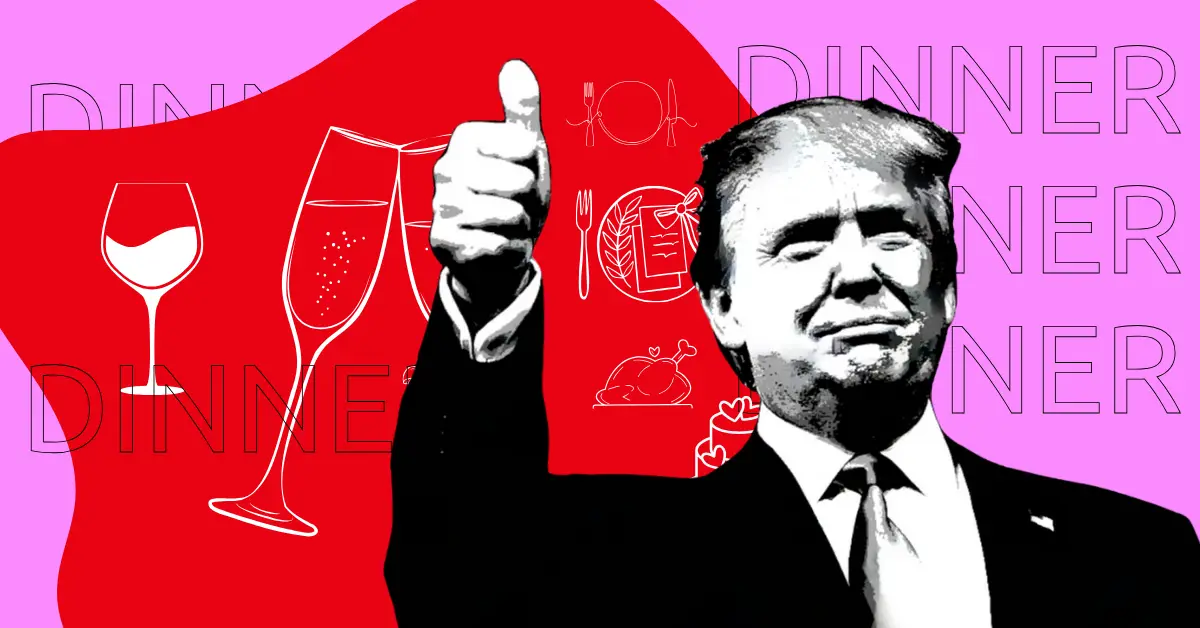
The recent buzz surrounding an exclusive dining event with former President Donald Trump has turned heads both in the political and cryptocurrency worlds. What began as a promotional stunt for a crypto meme coin dubbed “$TRUMP” has evolved into a multimillion-dollar spectacle, merging political allure with the speculative frenzy of digital tokens. This unusual intersection of power, money, and technology offers a revealing glimpse into how cryptocurrencies are reshaping social access and political influence in contemporary America.
At the heart of this phenomenon lies the unique mechanism for attending the dinner, held at Trump’s private golf club in Sterling, Virginia. Instead of traditional fundraiser tickets or open invitations, access was limited strictly to the top 220 purchasers of the $TRUMP token. This method demanded an enormous financial outlay, with some “high rollers” shelling out anything from tens of thousands to an eye-popping $16.4 million apiece. But not all attendees paid such steep prices. Among them, savvy speculators like Morten Christensen found clever ways to game the system. By coordinating token trades with friends, Christensen managed to aggregate enough holdings to receive an invitation while personally spending only about $1,200. This strategy illustrates how digital assets and social collaboration can disrupt conventional exclusivity, making a seemingly inaccessible event attainable through tactical token swaps rather than pure wealth.
More than just a bizarre method of entry, the $TRUMP token’s skyrocketing value—jumping over 70% post-dinner announcement—speaks volumes about the fusion of political branding and crypto hype. Investors weren’t merely buying a digital asset; they were purchasing access to a high-profile social occasion imbued with potential influence, prestige, and networking opportunities, all wrapped in the allure of rubbing shoulders with a former president. Critics, however, lambast the setup as a “pay-to-play” carnival, where political ties become commodified, blurring ethical boundaries and raising pressing questions about fairness and democratic access. This criticism reflects broader concerns that political clout should not be auctioned to the highest bidder, yet here digital currency serves as both ticket and currency in a marketplace of influence.
Adding further intrigue—and controversy—is the Trump family’s growing entanglement with the cryptocurrency sphere. Their involvement has not escaped scrutiny from Washington lawmakers and regulators, especially as Democratic lawmakers have stalled stablecoin regulations, citing potential conflicts linked to the former president’s crypto ventures. This entwinement underscores how cryptocurrency has transcended its early niche status to become a battleground for political power and regulatory oversight. The presence of foreign nationals among the dinner guests also accentuates international dimensions, complicating the implications around political donations and influence bought via digital means. Trump’s campaign branding of the event as “the most exclusive” gathering highlights the prestige factor, yet this ostentatious exclusivity sparks critical examination of the effects when wealth and digital assets override traditional democratic principles for access.
Beyond the spectacle and headlines, this dinner serves as a microcosm of the transformative role cryptocurrency is playing in redefining political and social gatekeeping. Historically, private dinners with political figures have been reserved for established elites or major donors, but the advent of blockchain and meme coins can democratize or at least disrupt these dynamics—allowing entire new classes of investors to gain entry based on novel forms of speculative capital. However, whether this shift challenges or entrenches existing inequalities remains an open question. The technology’s novelty might mask the perpetuation of exclusivity under new guises, as those with technical savvy or collective strategies exploit loopholes to bypass traditional financial barriers.
Ultimately, the $TRUMP meme coin dinner exemplifies the complex crossroads where cryptocurrency, politics, and social stratification converge. It reveals how digital tokens extend their function beyond mere financial instruments into tools that confer social status and political currency with tangible real-world ramifications. From multimillion-dollar spends to clever token pooling among friends, the event magnified debates around ethics, influence, and the changing landscape of American political culture in the digital era. As cryptocurrency increasingly infiltrates broader societal domains, episodes like this illuminate both its disruptive potential and its inherent risks, raising essential questions about transparency, fairness, and the future of political engagement in an age where digital capital can open doors once firmly locked by traditional means.
—
想揭露消费阴谋?用IPRoyal的安全代理保护你的隐私,像Mia一样做个聪明的消费侦探!了解更多
